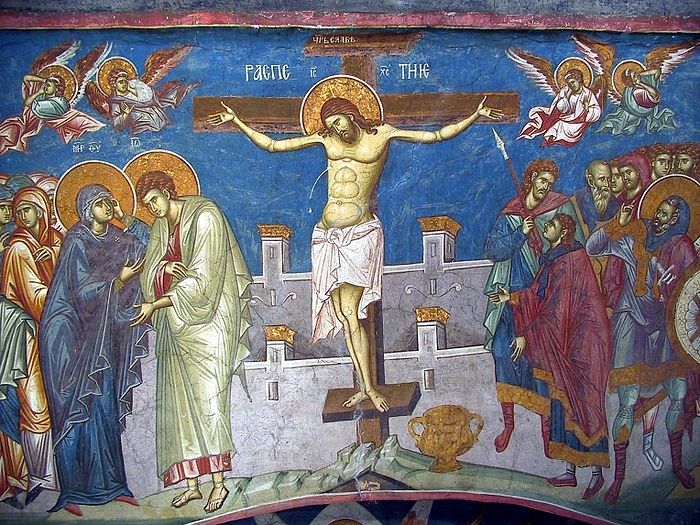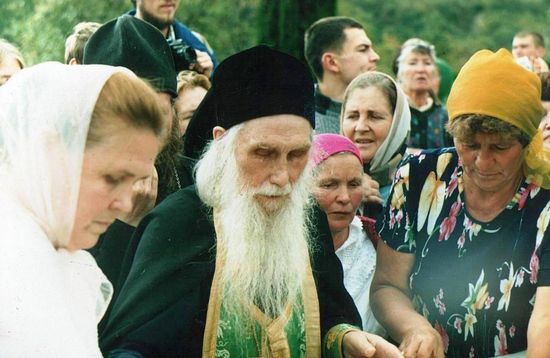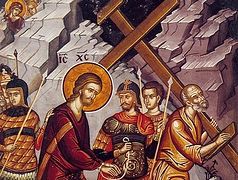Today the Master of creation and Lord of Glory is nailed upon the Cross, and His side is pierced.
He tastes gall and vinegar, and the sweetness of the Church is crowned with a crown of thorns…
In the name of the Father, the Son, and the Holy Spirit!
An involuntary sorrow now fills our souls, pouring forth often in tears when we hear in the Gospel reading and moving hymns the touching story of our Lord Jesus Christ’s suffering. And shouldn’t we, Christians, members of His Body, recipients of his benefactions, co-suffer with Him, wounded by the crown of thorns? Shouldn’t we lament bitterly at the sight of our great Benefactor’s inexpressible sufferings?
It is not just difficult but positively impossible to imagine anything more shocking than the spectacle on Golgotha. Here is the inexpressible miracle of divine love for its rebellious creation, man. This miracle began back in earthly paradise along with the creation of man, and it was completed on Golgotha with the death of the God-man.
Created out of divine love, the first-created man was endowed with all the perfections and pleasures of life. What more could he desire for himself in paradise, having received everything he needed from God? If someone where to ask us, “What would you need to make your life blessed,” we would probably reply, “We need that there be on earth no catastrophes, misfortunes, or sorrows; that everyone would only delight in everyone else, having no causes for enmity with each other; and, finally, so that people would never die but live forever in blessedness.”
Isn’t that so? Well just imagine, dear brothers and sisters, that this was all given to mankind. Man did not even have time to proclaim this desire before the greatly loving God had given all of it to him without his even asking for it. God—Omnipotent Love—created man for nothing else but blessedness, and blessedness eternally. So that man could taste the fullness of this blessedness, the loving Creator gave him a rational mind and freedom. But man will always remain man. How people are with their inclinations now, this we know. The same sinful inclinations were also present in the first people.
Having received from God everything for blessedness, not satisfied with his excellent state, man thought, “This is not enough for me.” The tempting words of the snake, Ye shall be as gods (Gen. 3:5), initiated in man the desire to be God. Made a little lower than the angels (cf. Ps. 8:6), the king to whom were subject all the earthly animals, man in paradise did not consider himself pleased with his state. Man desired what was not according to his organic, created nature, and thus was the first great sin committed.
Then began the history of mankind’s suffering, the beginning of a long train of opposition to divine will, errors, crimes, and disasters for the insubordinate creature who hasn’t understood anything. How many promises, commandments, threats, and punishments did God use to bring to reason and restore fallen man!
Finally, in order to raise him up to the original state lost through sin, in the last days means were brought to use that only infinite divine love could invent. The Son of God Himself took on human flesh! God became man in order to make man God—to do what man had so audaciously once tried to seize on his own. Without having committed any sin, the God-man brought Himself as a sacrifice for the sins of the whole world. God’s righteous judgment, which demands punishment of the guilty, was satisfied. His podvig of the Cross stretched from Bethlehem to Golgotha, and on Golgotha it was completed.
This bitter cup of all human evils, which the Savior had to drink on Golgotha for mankind, was so horrible for the Sinless One that it brought Him to sorrow and sadness. O my Father, he prayed in the Garden of Gethsemane, if it be possible, let this cup pass from me (Matt. 26:39). My soul is exceeding sorrowful, even unto death (Matt. 26:38). He sorrows of course not because impending death frightened Him. Death is terrible for sinners; it is frightening because it is the unknown—or more precisely, because one’s future lot beyond the grave is unknown. It is not possible that the Son of God should have this fear. Everything is known to Him, both the future and the present. He sorrows over the thought of the horrifying, unimaginable mass of human iniquity, the burden of punishment for these iniquities.
Just what the weight was of the divine Sufferer’s torments we, brothers and sisters, have just heard from the Gospel reading. But the Gospel only tells us of the outward suffering that can be perceived by the viewer’s external senses without revealing what took place in His spirit, not revealing the secret of the God-man’s inner suffering. And what can be compared to this suffering? There have been many sufferers in the world, inhumanly tortured or murdered, and there will be many more. But there never has been such a Sufferer nor will there ever be.
It is hard for a righteous man to suffer undeservedly, innocently. But even if he does not find righteousness in people, he can still find consolation in the fact that there is a Righteously-judging God, Who will never abandon him. This faith can ease the most onerous sufferings. But the crucified Christ was deprived of even this single consolation. The fullness of divine Righteous Judgment crashed down upon Him with all its weight, because He bore on Himself the whole aggregate of the crimes of this sinful world, as the prophet said, the chastisement of our peace was upon him (Is. 53:5). To the Savior’s human nature it seemed that the Father had forsaken Him, and from his suffering soul broke forth the staggering cry, My God, my God! Why hast Thou forsaken Me? (Matt. 27:46). There are no words worthy to describe the whole grandeur of the Sacrifice on Golgotha, the fullness of boundless divine love for iniquitous mankind.
How did mankind relate to this unprecedented event on Golgotha? People not only brought their Benefactor to the Cross, they also did not cease to mock and insult Him as he suffered on that Cross. Then finally, It is finished! (Jn. 19:30). The terrible, most glorious mystery was finished; the indescribable, unparalleled event was finished: The divine Sufferer gave up His spirit!
Insensate nature could not endure this moment; all creation changed from fear, quaked with horror, the sun darkened and darkness covered the earth purpled with the Blood of the God-man, the rocks broke asunder, the veil of the temple was rent in twain, opening the Holy of Holies, the graves were opened, and the dead arose from their wakeless sleep. And the living shook when they heard the thunder of heavenly signs; they heard, and repented. Some of them already preached the Crucified Son of God, while others in fear and terror, seeing what took place, returned from the place of this evil doing, and smote their breasts (Lk. 23:48) All those who shouted Crucify Him! (Lk. 23:21) and their rulers, who did not turn to the faith and did not repent, of course received the due reward for their deeds and even now experience hopeless woe in the place of eternal torments.
However, brothers and sisters, no matter how natural it is for us to lament the Lord’s torturous sufferings at the foot of the Cross, we need more to weep here for ourselves, for our sins. Weep not for me, but weep for yourselves, and for your children (Lk. 23:28), said the Divine Cross-Bearer on the road to the place of crucifixion. We need to look at ourselves. These people, who watched the Crucifixion and perhaps once shouted, “Crucify Him, crucify Him!” were in ignorance; they were lead into error by their leaders and did not know for sure that Christ is the Son of God and that He would be resurrected. But we, my dears, all know this for sure, and therefore more will be asked of us. True, we reverently honor the Lord’s Cross and bow down to the Lord crucified for our sake. But do we feel, dear brothers and sisters, that the solemn rite of bowing down before the Cross serves not only as a remembrance of an event that happened long ago, but also as a visible reminder that Jesus Christ suffered for each one of us.
He did not suffer only from and for those who nailed Him to the Cross, but He suffered for each one of us standing here. The Cross of Christ tells us that our sins are a great evil, for they were the very cause of our Savior’s death on the Cross; that by giving ourselves over to them we become enemies of God and our own selves; that truth is infinite and it punishes iniquity in the most terrible manner—it poured out its full cup of wrath even upon the God-man, Whose good will it was to bear on Himself the sins of the world. The Cross tells us that, it would follow, the lot of the sinner, if he remains a sinner, is his inescapable eternal torment.
The Cross of Christ tells us of the Heavenly Father’s endless love for the sinful human race, for he did not spare His Only Begotten Son, but gave Him over for us; and the Cross tells us of the extreme, marvelous self-denial of the Son of God. And shouldn’t we also render Him mutual love for this and fulfill His commandments? The Cross of Christ reminds us of our Fatherland on high, the entrance to which was closed for thousands of years, but which with the appearance of the Cross of the Lord was finally opened; it reminds us of those eternal blessings that are prepared there from the creation of the world for all who love God. O beloved homeland, desired of our hearts! Who of us earthly wanderers would not desire to make his abode in you? Who after many and difficult toils and labors, tears and weeping would not hasten with joy to find rest in your bright habitations, where there are no more tears or sadness, but only endless blessedness? But sins, sins do not allow us, dear brothers and sisters, into the courts of the Heavenly Father; they do not allow us to behold even from afar the Heavenly Jerusalem, our city, our Fatherland, which here we can only seek. Sweetly beats the heart of the righteous one when beholding the Wood of the Cross he is transported, if only in thought, to the paradise of sweetness opened for him by this sacred Tree. And to the contrary, how must sinners wail at the foot of the Lord’s Cross when they vividly comprehend that this paradise of sweetness may be lost to them forever!
Dear brothers and sister, can we, bought with such a price, remain indifferent, contemplating the grievous sufferings that our Savior bore for us? Can we not be penetrated with a feeling of reverent amazement at the thought that suffering so shamefully and torturously is no ordinary man but the God-man, and He suffers voluntarily—although whole legions of angels could have appeared to protect Him at the wave of His hand? Could we, finally, in the humble awareness of our insignificance, of our great sins, not have heartfelt love for Him and gratitude at the thought of the benefactions brought to the human race through His death on the Cross? By it was the eternal curse that weighed upon people revoked, by it have people made peace with God, and by it is paradise open to us.
What shall I render unto the Lord for all the good that He has rendered unto me? (Ps. 115:3). He does not need our goods (cf. Ps. 15:2). A sacrifice unto God is a broken spirit, a heart that is broken and humbled, God will not despise (Ps. 50:19). From the Cross He stretches out His most pure, crucified arms and meekly calls to us, My son! Give me thy heart (Prov. 23:26). Everything has been done for our happiness. It is up to us to respond to this tender summons, Ready is my heart, O God, ready is my heart (Ps. 56:8), and we call to Thee: Before Thy Cross, we bow down, O Master, and Thy holy resurrection we glorify! Amen.
1961



